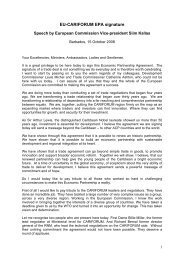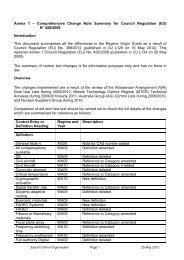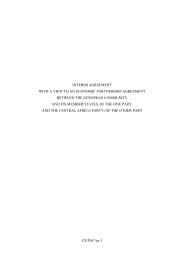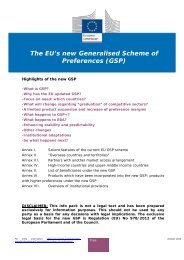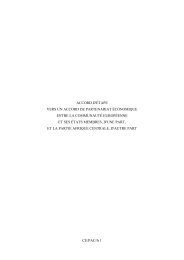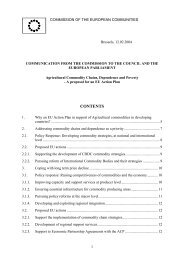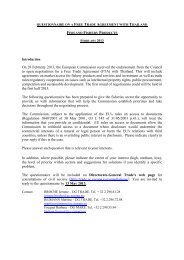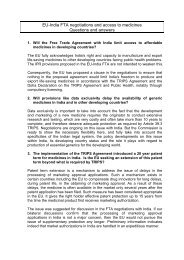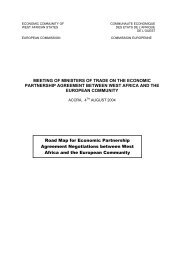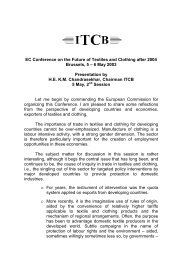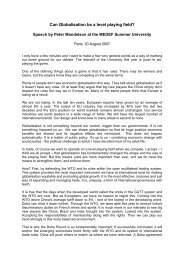Report on the Implementation of the derogation to ... - Trade Websites
Report on the Implementation of the derogation to ... - Trade Websites
Report on the Implementation of the derogation to ... - Trade Websites
Create successful ePaper yourself
Turn your PDF publications into a flip-book with our unique Google optimized e-Paper software.
Final <str<strong>on</strong>g>Report</str<strong>on</strong>g><br />
RoO Derogati<strong>on</strong> under <strong>the</strong> PACP-IEPA<br />
O<strong>the</strong>r management issues for WCPFC<br />
In managing <strong>the</strong> s<strong>to</strong>cks under its care, <strong>the</strong> Commissi<strong>on</strong> has yet <strong>to</strong> establish formal reference<br />
points 162 - target (TRP) or limit (LRP) - <strong>to</strong> guide <strong>the</strong> management <strong>of</strong> <strong>the</strong>se s<strong>to</strong>cks, and <strong>to</strong> develop<br />
associated harvest c<strong>on</strong>trol rules (HCRs). Whilst it has this gap in <strong>the</strong> management framework in<br />
comm<strong>on</strong> with most o<strong>the</strong>r RFMOs, and although de fac<strong>to</strong> MSY-based indica<strong>to</strong>rs are already used in<br />
assessing <strong>the</strong> c<strong>on</strong>diti<strong>on</strong> <strong>of</strong> <strong>the</strong> s<strong>to</strong>cks, <strong>the</strong> absence <strong>of</strong> formal RPs and HCRs is still seen as a major<br />
weakness, and was identified such in <strong>the</strong> recent MSC assessment <strong>of</strong> <strong>the</strong> PNA skipjack fishery. 163 In<br />
particular, work has commenced in identifying and evaluating possible limit reference points, with<br />
<strong>the</strong> c<strong>on</strong>clusi<strong>on</strong> that adopti<strong>on</strong> <strong>of</strong> limit reference points is important immediately for bigeye and<br />
yellowfin, whereas setting target reference points <strong>to</strong> maximize fishery importance is <strong>the</strong> priority for<br />
skipjack. 164 With <strong>the</strong> recent approval <strong>of</strong> MSC certificati<strong>on</strong> for <strong>the</strong> PNA unassociated skipjack fishery,<br />
WCPFC, through PNA, will be required <strong>to</strong> implement RPs and HCRs as firm c<strong>on</strong>diti<strong>on</strong>s <strong>of</strong> <strong>the</strong><br />
certificati<strong>on</strong>.<br />
Ano<strong>the</strong>r issue for <strong>the</strong> Commissi<strong>on</strong> has been with its decisi<strong>on</strong>-making process (Art. 22), which<br />
normally occurs by c<strong>on</strong>sensus <strong>on</strong> substantive matters such as <strong>the</strong> adopti<strong>on</strong> <strong>of</strong> CMMs. However, it<br />
has proved difficult <strong>to</strong> achieve c<strong>on</strong>sensus <strong>on</strong> several c<strong>on</strong>tentious management issues. With a twochamber<br />
voting system (FFA and n<strong>on</strong>-FFA members) and a two or more vote majority required in<br />
each chamber, <strong>the</strong> Commissi<strong>on</strong> has thus far been unwilling <strong>to</strong> go <strong>to</strong> a formal vote. The decisi<strong>on</strong><br />
making process is perceived as a potential weakness in achieving endorsement for required<br />
management decisi<strong>on</strong>s, such as <strong>the</strong> planned revisi<strong>on</strong>s <strong>to</strong> CMM 2008-01.<br />
EU involvement in WCPFC<br />
The EU has been a member <strong>of</strong> WCPFC since so<strong>on</strong> after its incepti<strong>on</strong>, and is part <strong>of</strong> <strong>the</strong> diverse n<strong>on</strong>-<br />
FFA voting chamber. Despite its relatively minor involvement in fishing (and processing) activity in<br />
165<br />
<strong>the</strong> WCPO, <strong>the</strong> EU is an active and regular participant in <strong>the</strong> work <strong>of</strong> <strong>the</strong> Commissi<strong>on</strong>. It has<br />
presented ten delegati<strong>on</strong> papers and proposals <strong>to</strong> Regular Sessi<strong>on</strong>s <strong>of</strong> <strong>the</strong> Commissi<strong>on</strong> <strong>on</strong> <strong>to</strong>pics<br />
such as IUU fishing, a CMM <strong>on</strong> port state measures, catch documentati<strong>on</strong> scheme (CDS), support for<br />
developing states under Article 30, and observer cross-endorsement. It also participates fully in <strong>the</strong><br />
work <strong>of</strong> <strong>the</strong> Commissi<strong>on</strong>’s subsidiary bodies – <strong>the</strong> Scientific Committee and <strong>the</strong> Technical and<br />
Compliance Committee.<br />
ii)<br />
Secretariat <strong>of</strong> <strong>the</strong> Pacific Community<br />
The Secretariat <strong>of</strong> <strong>the</strong> Pacific Community (SPC), formed in 1947 as <strong>the</strong> South Pacific Commissi<strong>on</strong> and<br />
with a broad membership currently including PICs, PI terri<strong>to</strong>ries and Australia, France, NZ and <strong>the</strong><br />
USA, provides technical services across various sec<strong>to</strong>rs <strong>to</strong> its PICs and PI terri<strong>to</strong>ries. SPC’s Oceanic<br />
Fisheries Programme (OFP) provides scientific services not <strong>on</strong>ly <strong>to</strong> its members, but also serves as<br />
science provider and data manager <strong>to</strong> <strong>the</strong> WCPFC, undertaking s<strong>to</strong>ck assessments and maintaining a<br />
range <strong>of</strong> databases for <strong>the</strong> Commissi<strong>on</strong>.<br />
162<br />
Reference points are indica<strong>to</strong>rs <strong>of</strong> <strong>the</strong> status <strong>of</strong> a s<strong>to</strong>ck. Target reference points (TRP) indicate <strong>the</strong> desirable<br />
positi<strong>on</strong> for <strong>the</strong> s<strong>to</strong>ck <strong>to</strong> be in with respect <strong>to</strong> fishing mortality and recruitment, are <strong>of</strong>ten based <strong>on</strong> Maximum<br />
Sustainable Yield (MSY) levels and may incorporate socio-ec<strong>on</strong>omic goals. Limit reference points (LRPs) are <strong>the</strong><br />
minimum biologically acceptable limits <strong>to</strong> sustainable harvest.<br />
163 MSC 2011.<br />
164 For example, Preece et al. 2011; Harley & Davies 2011; earlier papers at SC6.<br />
165 Four Spanish vessels fishing under FPAs, 10 beneficially-owned vessels fishing under bilateral access<br />
agreements; <strong>to</strong>tal catch 2010 ~ 50,000 mt or < 3% <strong>of</strong> <strong>the</strong> WCPO catch; some l<strong>on</strong>gline fishing targeting<br />
swordfish.<br />
Linpico s.a.r.l. Page 93




